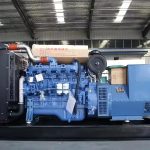Diesel Generator for Site Acceptance Testing A Comprehensive Guide

Introduction
Diesel generators play a crucial role in providing backup power during outages and ensuring uninterrupted operations in various industries. Site acceptance testing is a critical step in the deployment of a diesel generator to ensure that it meets the specified requirements and operates efficiently. This comprehensive guide explores the importance of diesel generators for site acceptance testing, the key components and features to consider, and best practices for conducting successful site acceptance tests.
Importance of Diesel Generators for Site Acceptance Testing
Site acceptance testing is a critical phase in the deployment of a diesel generator to a new location or facility. This process involves verifying that the generator meets the performance specifications outlined by the manufacturer and regulatory standards. By conducting thorough site acceptance testing, organizations can ensure that the diesel generator will function reliably during power outages and emergencies.

Diesel generators are widely used for backup power generation due to their reliability, durability, and cost-effectiveness. These generators are capable of providing continuous power for extended periods, making them ideal for critical applications such as hospitals, data centers, and industrial facilities. Site acceptance testing helps validate the operational readiness of a diesel generator and identifies any issues that need to be addressed before it is put into service.
Key Components and Features of Diesel Generators for Site Acceptance Testing
When selecting a diesel generator for site acceptance testing, it is essential to consider the key components and features that will impact its performance and reliability. Some of the critical components and features to evaluate include:
1. Engine: The diesel engine is the heart of the generator and is responsible for converting diesel fuel into mechanical energy. The engine's power output, fuel efficiency, and emissions levels are essential factors to assess during site acceptance testing.
2. Alternator: The alternator is responsible for converting the mechanical energy generated by the engine into electrical power. The alternator's efficiency, voltage regulation, and overload capacity should be evaluated to ensure reliable power generation.
3. Control Panel: The control panel is the brain of the generator and houses the monitoring and control systems. The control panel should be user-friendly, intuitive, and equipped with essential features such as remote monitoring, automatic start/stop functionality, and alarm notifications.
4. Fuel System: The fuel system delivers diesel fuel from the storage tank to the engine for combustion. The fuel system's capacity, filtration, and reliability are critical factors that can impact the generator's performance during site acceptance testing.
5. Cooling System: The cooling system helps regulate the temperature of the engine and prevent overheating. The cooling system's capacity, efficiency, and maintenance requirements should be evaluated to ensure optimal performance.
6. Exhaust System: The exhaust system is responsible for removing harmful emissions from the engine and dissipating heat. The exhaust system's design, emissions compliance, and noise levels should be assessed to ensure environmental compliance and worker safety.
7. Enclosure: The generator enclosure provides protection from environmental factors such as weather, dust, and noise. The enclosure's construction, sound attenuation, and ventilation should be evaluated to ensure the generator's long-term reliability and performance.
Best Practices for Conducting Site Acceptance Tests on Diesel Generators
To ensure a successful site acceptance test for a diesel generator, it is essential to follow best practices and guidelines to validate its performance and reliability. Some of the best practices for conducting site acceptance tests on diesel generators include:
1. Pre-Installation Inspection: Before conducting the site acceptance test, perform a thorough inspection of the generator to ensure that all components are in good working condition and meet the specified requirements.
2. Load Testing: Conduct load testing on the generator to verify its capacity to handle the anticipated electrical load. The generator should be tested under varying load conditions to assess its performance and efficiency.
3. Fuel Quality Testing: Verify the quality of the diesel fuel being used in the generator by conducting fuel quality testing. Poor-quality fuel can lead to engine damage and performance issues, so it is essential to use clean and high-quality fuel.
4. Environmental Conditions Testing: Test the generator under different environmental conditions, such as temperature extremes, humidity levels, and altitude changes, to assess its performance and reliability in real-world scenarios.
5. Noise Level Testing: Measure the noise levels generated by the diesel generator to ensure compliance with local regulations and minimize the impact on surrounding areas. The generator should be equipped with sound attenuation features to reduce noise emissions.
6. Safety and Emergency Shutdown Testing: Verify that the generator's safety features, such as automatic shutdown systems and emergency stop buttons, are functioning correctly. Conduct emergency shutdown testing to ensure that the generator can be safely stopped in case of a malfunction.
7. Remote Monitoring and Control Testing: Test the remote monitoring and control systems of the generator to ensure that operators can monitor its performance and receive real-time alerts in case of any issues. Remote access to the generator's control panel is essential for efficient operation and maintenance.
Conclusion
Diesel generators play a vital role in providing backup power during outages and ensuring uninterrupted operations in various industries. Site acceptance testing is a critical step in the deployment of a diesel generator to validate its performance and reliability under real-world conditions. By considering the key components and features of diesel generators, conducting thorough site acceptance tests, and following best practices, organizations can ensure that their generators will function reliably during emergencies and power outages. 300KW Diesel Generator For Sale for site acceptance testing are essential assets that require careful evaluation and testing to ensure optimal performance and reliability.
